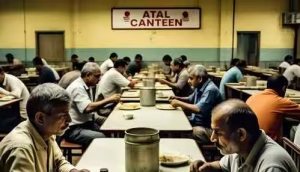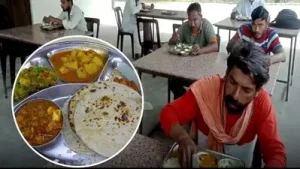New Delhi – The Delhi government has announced an ambitious plan to establish 100 Atal Canteens across the city, as Delhi Budget Allocates Rs.100 Crore for Atal Canteens to ensure affordable meals for residents. The Atal Canteens Initiative aims to address food insecurity and support economically weaker sections by offering nutritious meals at subsidized rates.
Overview of the Atal Canteen Initiative

The Delhi Budget Allocates Rs.100 Crore for Atal Canteens Scheme is designed to provide hygienic and affordable meals to daily wage earners, laborers, students, and low-income groups in Delhi. With the rising cost of living, the initiative is expected to serve as a major relief to those struggling to afford nutritious food. Each canteen will offer freshly prepared meals at nominal prices, making quality food accessible to everyone.
Objectives of the Scheme
The primary objectives of the Delhi Budget Allocates Rs.100 Crore for Atal Canteens initiative include:
- Providing Affordable Meals: Ensuring access to low-cost, nutritious food for economically weaker sections.
- Reducing Food Insecurity: Addressing hunger among daily wage workers, students, and marginalized communities.
- Employment Generation: Creating job opportunities in the food and service sector through the establishment of canteens.
- Promoting Public Welfare: Strengthening the government’s social welfare framework by ensuring that no individual goes hungry due to financial constraints.
Budget Allocation and Financial Planning
The Delhi Budget Allocates Rs.100 Crore for Atal Canteens, ensuring its smooth implementation and long-term sustainability. The Delhi Budget Allocates Rs.100 Crore for Atal Canteens will cover:
- Infrastructure Development: Setting up 100 Atal Canteens across key locations in Delhi.
- Operational Costs: Ensuring staff salaries, raw material procurement, and daily operational expenses.
- Subsidization of Meals: Offering affordable meal prices while maintaining high food quality standards.
- Technology and Monitoring: Implementing a digital monitoring system to ensure transparency and efficiency in operations.
Meal Pricing and Menu Details
The government aims to offer meals at highly subsidized rates. While exact pricing is yet to be finalized, it is expected that breakfast, lunch, and dinner will be available for as low as ₹5-10 per meal. The menu will include:

- Breakfast Options: Idli-sambhar, poha, upma, and parathas.
- Lunch and Dinner: Rice, dal, seasonal vegetables, chapati, and khichdi.
- Nutritional Value: Each meal will be designed to provide essential nutrients to maintain a balanced diet.
Implementation Plan of Atal Canteens
The Delhi government has outlined a phased implementation plan:
- Phase 1: Establishment of 25 Atal Canteens in high-demand areas, such as industrial zones, bus terminals, and railway stations.
- Phase 2: Expansion to educational institutions, hospitals, and major public spaces.
- Phase 3: Setting up additional canteens to cover all major districts in Delhi.
- Final Phase: Full-scale rollout and regular monitoring for quality assurance.
Target Beneficiaries
The Atal Canteens are primarily aimed at benefiting:


- Daily wage workers and laborers
- Students from economically weaker sections
- Migrant workers and homeless individuals
- Low-income families
Role of the Delhi Government and Public Participation
The Delhi government will oversee the development of Atal Canteens project, ensuring:
- Transparency and Accountability: Regular audits and quality checks.
- Public-Private Partnership: Collaboration with NGOs and corporate partners.
- Public Awareness Campaigns: Promoting the initiative through digital and offline media.
Challenges and Potential Solutions
Despite the promising initiative, some challenges may arise:
- Quality Control: Ensuring consistent food quality across all canteens.
- Solution: Regular inspections and stringent food safety protocols.
- Sustainability: Managing long-term operational costs.
- Solution: Encouraging CSR funding and public donations.
- Location Selection: Identifying the most strategic areas for canteen placement.
- Solution: Conducting demographic studies and surveys to determine high-need areas.
Comparison with Similar Initiatives in India
Delhi Budget Allocates Rs.100 Crore for Atal Canteens is an initiative is similar to other subsidized meal schemes in India:
- Tamil Nadu’s Amma Canteens: Provides affordable meals at ₹3-5.
- Karnataka’s Indira Canteens: Offers meals at subsidized rates in urban areas.
- Rajasthan’s Annapurna Rasoi: Focuses on feeding low-income groups.
By studying the success of these programs, the Delhi government can implement best practices and avoid common pitfalls.
Also Read: Delhi High Court Notice to Parvesh Verma 2025: Critical Analysis of The Petition
Public Reactions and Political Responses
The Atal Canteen project has received mixed reactions:
- Supporters: Appreciate the government’s commitment to social welfare and food security.
- Critics: Question the feasibility and long-term sustainability of the scheme.
- Economists: Highlight the potential economic benefits of reducing hunger and malnutrition.
Future Prospects and Expansion Plans
The Delhi government aims to expand the initiative further by:
- Increasing the number of canteens based on demand.
- Introducing mobile canteens for underserved areas.
- Enhancing digital payment options for cashless transactions.
Closing Remarks
The Atal Canteen initiative is a crucial step towards ensuring food security and social welfare in Delhi. With a well-structured implementation plan and strong government oversight, this scheme has the potential to transform the lives of thousands by providing nutritious meals at affordable prices. The success of this initiative will depend on efficient management, quality control, and sustained public engagement.

